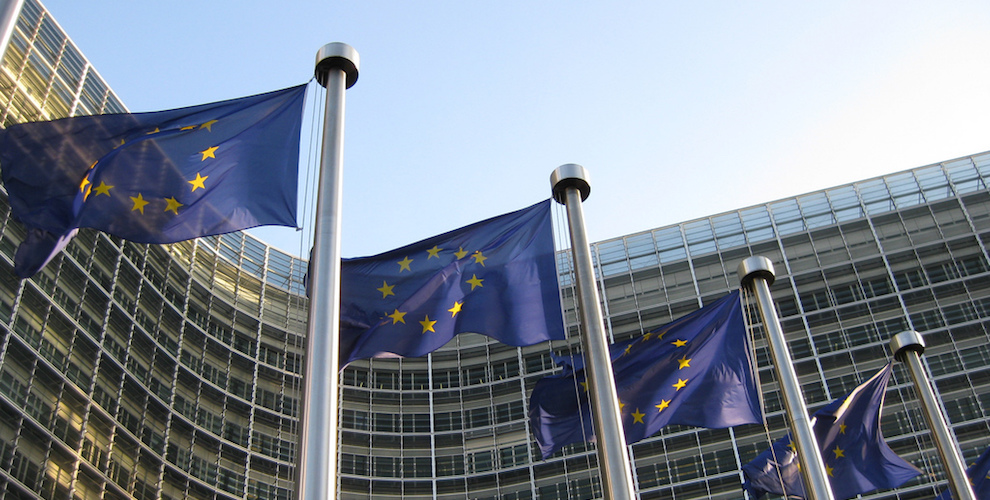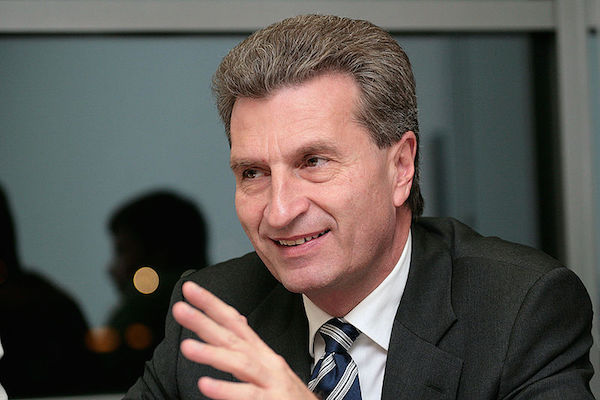
BERLIN — The European Union’s new commissioner for digital affairs didn’t waste any time. Days before starting the job at the end of October, Günther Oettinger (his official title is commissioner for digital economy and society) announced plans to reform European copyright law in 2015. That could mean introducing a levy on search engines when they show results for European companies, he said — a contested issue that’s been pushed by large news media companies from across Europe in recent months.
Oettinger has announced few details of his plans for copyright reform. But in an interview with the German daily newspaper Handelsblatt, he made it clear that he wants to tackle Google’s profits from listing European companies in search results. “If Google takes intellectual property from the EU and works with that, then the EU can protect that property and demand Google pay for that,” he said.
Copyright laws nicknamed “Google taxes” have been passed in a few European countries over the past few years. That name is deceptive — the laws don’t call for an actual tax since any fee Google is made to pay will go to publishers, not governments — but they have left Google at the center of legal battles driven by major publishers. Spain passed a law at the end of October that charges search engines to pay a copyright collection agency for including snippets from and links to news websites. In 2013, France’s government settled news publishers’ demands for copyright reform by striking a deal with Google: For a flat rate of €60 million (invested into a fund for digital publishing), the company was allowed to continue listing news articles in search results.

Günther Oettinger. Photo by Jacques Grießmayer/CC.
Oettinger has said that a proposal for EU copyright reform should be ready at some point next year. So far, what’s known of his plan has drawn comparison with the German law known as the ancillary copyright law for press publishers. Oettinger, who is German, spoke about his plans for the European law in a closed session of the German Bundestag at the beginning of November.
 In Germany, the new ancillary copyright law for press publishers has had a rough start. The law went into effect last August and, while some details still need to be ironed out in court, the controversial heart of it — whether search engines will pay money to publishers — has an uncertain future. Google has refused to pay fees to publish snippets from news sites, and instead asked German publishers last year to opt in if they want to be included in Google News search results, waiving their right to cash in on the use of their content according to the new law. To avoid paying the collection agency, VG Media, which represents the publishers that chose not to opt in, Google stopped showing snippets from their news articles on Oct. 23. Shortly after that, the publishers in VG Media gave Google a license to restore snippets to their search results — for free. Berlin-based Axel Springer, one of Europe’s largest publishers, announced on Nov. 5 that it had caved to Google’s pressure after traffic to its websites from Google dropped by 40 percent and from Google News by 80 percent when snippets were left out of search results.
In Germany, the new ancillary copyright law for press publishers has had a rough start. The law went into effect last August and, while some details still need to be ironed out in court, the controversial heart of it — whether search engines will pay money to publishers — has an uncertain future. Google has refused to pay fees to publish snippets from news sites, and instead asked German publishers last year to opt in if they want to be included in Google News search results, waiving their right to cash in on the use of their content according to the new law. To avoid paying the collection agency, VG Media, which represents the publishers that chose not to opt in, Google stopped showing snippets from their news articles on Oct. 23. Shortly after that, the publishers in VG Media gave Google a license to restore snippets to their search results — for free. Berlin-based Axel Springer, one of Europe’s largest publishers, announced on Nov. 5 that it had caved to Google’s pressure after traffic to its websites from Google dropped by 40 percent and from Google News by 80 percent when snippets were left out of search results.
Germany’s law addressing how much of news articles can be distributed on the Internet — and if the limit allowed without charge should be links, snippets, or quotes — sparked debate here over whether news websites need a law specific to the online media. Axel Springer, some other large German publishers and two of the industry’s largest lobby groups, the Federation of German Newspaper Publishers (BDZV) and the Association of German Magazine Publishers (VDZ) say the law fills a gap in Internet copyright regulations.
“An ancillary copyright law for press publishers is something that’s actually become necessary with digitization, also in EU copyright law. Record companies, broadcasters, and other industries have had that on the EU level for a long time,” said Christoph Fiedler, VDZ’s director of European and media policy. Critics have argued that copyright law for online news can’t be compared to other industries like film or music, where there are generally more rights holders involved in producing an individual work.
Advocates of Germany’s digital copyright law argue that charging search engines for distributing content from news websites, combined with advertising and subscriptions, is a sustainable model for financing journalism. Christoph Keese, vice president of Axel Springer and the most vocal supporter of the German copyright reform, says foundations, sponsors, and political support for journalism are models that limit publishers’ independence. “Axel Springer and the publishers that agree with us see media that’s financed by readers and advertisers as ideal and worth striving for. When revenue from readers and from ads goes down, then you have to try other revenue models. Licensing is an obvious approach,” said Keese.
Critics of the new national copyright laws have said Europe’s struggling news publishing industry is looking to Google to keep itself afloat. But Axel Springer, the most prominent backer of the German law, has remained profitable as it expands digitally. Axel Springer’s quarterly report released at the beginning of November shows the company’s profit growth slowing, with 52 percent of its revenue now comes from digital.
Among the publishers who opted to be included in Google’s search results were two of the country’s most widely distributed daily newspapers, the Frankfurter Allgemeine Zeitung and the Süddeutsche Zeitung, which are not represented by VG Media. A number of other large news publishers in Germany, including Axel Springer, Burda, and Funke Mediengruppe, remain part of VG Media.
 The divide between supporters and opponents of the German copyright law positions newer, smaller news websites against large traditional newspaper publishers. Perlentaucher, a website that aggregates cultural news from other media sources, is one of the supporters of the campaign Initiative Against the Ancillary Copyright Law for Press Publishers (IGEL). Perlentaucher editor Thierry Chervel says many German newspapers have resisted transitioning to digital, with most larger papers still only putting a small part of their content online:
The divide between supporters and opponents of the German copyright law positions newer, smaller news websites against large traditional newspaper publishers. Perlentaucher, a website that aggregates cultural news from other media sources, is one of the supporters of the campaign Initiative Against the Ancillary Copyright Law for Press Publishers (IGEL). Perlentaucher editor Thierry Chervel says many German newspapers have resisted transitioning to digital, with most larger papers still only putting a small part of their content online:
In the United States, it might still be possible for online-only media to be profitable because the American public is so big and there are a lot of people speaking one language. And internationally English is a lingua franca. In German-speaking countries, online media can hardly be made profitable, and we’re not even talking about the smaller countries in Europe.
Instead, he argues, there needs to be more public media and foundation-financed journalism. “We need to be thinking about that and not about levying information,” said Chervel.
While the parameters of new European copyright reform are being worked out in Brussels, details of the existing German law remain unclear. According to the law, when publishers receive payment from search engines, journalists are also supposed to be paid “appropriately.” Those exact rates still need to be agreed upon. The German freelance journalists’ union Freischreiber, another supporter of the opposition IGEL campaign, has criticized VG Media for what they say is a lack of transparency about the amounts journalists might be paid from the license revenue. “Copyright holders who write for newspapers and magazines are obligated to be part of this, but it’s not formulated anywhere how rights owners will be involved — neither in the law nor in the tariffs described by VG Media — with what percentages, what fees. That’s barely a consideration. It’s just a statement of intent,” said Henry Steinhau, a member of Freischreiber’s executive board who deals with copyright issues.
Talks over European copyright reform are still at the very beginning, according to Christoph Keese. “We’ll definitely help shape the debate,” Keese said. Axel Springer filed one of the 18 complaints (as of February) in an antitrust case against what they see as Google’s dominance in the European market. The case has run parallel to the new copyright legislation introduced around Europe. Google has over a 90 percent market share of search engines there, compared to a share of about 68 percent in the United States. (And last Thursday, the European Parliament approved approved a motion suggesting breaking up Google, saying the European Commission should “consider proposals with the aim of unbundling search engines from other commercial services.” Oettinger said he would oppose such a move.)
Angela Mills Wade, director of the European Publishers Council (of which Axel Springer, News Corp, and other large European publishers are members), is critical of Google for showing online news content in search results without paying publishers. Europe’s ongoing antitrust investigations of Google are publishers’ best chance for staving off that use without charge, according to Mills Wade. “Suing Google all over the world for copyright infringement is an expensive business with very uncertain outcomes. The only recourse is to go through competition policy and to file complaints against abuse of their dominant position,” she said.
Catherine Stupp is a freelance journalist based in Berlin.